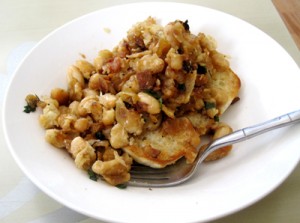 The link below contains an excellent article about a new UC Davis olive oil consumer study. Essentially the study showed that consumers do not prefer the oil that olive oil experts rate as the highest quality. The main challenge for consumers is acquiring the taste for the bitter and pungent qualities of real extra virgin olive oil. Acquiring this taste is similar to acquiring the taste for the strong and bitter flavors found in coffee and beer. However, when the consumers learned that the strong flavors found in real extra virgin olive oil is evidence of a high concentration of antioxidants they began to be more receptive.
The link below contains an excellent article about a new UC Davis olive oil consumer study. Essentially the study showed that consumers do not prefer the oil that olive oil experts rate as the highest quality. The main challenge for consumers is acquiring the taste for the bitter and pungent qualities of real extra virgin olive oil. Acquiring this taste is similar to acquiring the taste for the strong and bitter flavors found in coffee and beer. However, when the consumers learned that the strong flavors found in real extra virgin olive oil is evidence of a high concentration of antioxidants they began to be more receptive.
admin
Harvest 2010
We have been very busy with our harvest the last two months. The crop is wonderful this year due to the mild Spring, the warm Summer and the cool Fall. Below are some of our harvest pictures. We wish you Happy Holidays and we thank you for all your support.
We recently were awarded a special distinction. Marco Oreggia, one of Italy’s premier olive oil tasters, awarded our oil a score of 94 which tied us for position 28 out of 3000 oils tasted from all over the world, Europe and Italy. He also chose us in his Best 20 olive oil producers out of over 1500 producers.
The gorgeous site of fresh hand-picked olives
The olives begin their journey
The olives make their way to the hammermill to be crushed
After being crushed the olive paste enters the malaxers to be prepared for the decanter
The beautiful fresh oil emerges from the decanter
Funny Honey
It turns out that olive oil is not the only product where large producers import inferior products then add it to the real thing to cut costs. In honey’s case they are cutting the real thing with high fructose corn syrup and other additives while still calling the product pure honey. Many states, including California, have passed laws making it possible to bring civil cases against those who are engaging in this practice. Their hope is this will induce the Federal government to institute similar protections for the consumer nationwide. Profit is an important motivation for business, however, when it comes to food producers, profit needs to be realized through providing health, safety, and honesty to our customers.
The High Cost of Cheap Food
The Surprise Journey Of Learning About Our Food Supply
The recent outbreak of salmonella poisoning causing 500 million eggs to be recalled have people wondering about our food supply. There are two excellent resources that reveal the truth about why these outbreaks occur. They are the movie, Food Inc., and the book, Animal Factory. These two resources document the harmful affect of modern practices in two key areas, cost and safety. While many are vaguely aware of the dangers of factory farming few know the real details that cause nationwide problems.
Cost
Most people know the corn industry in the US is subsidized but don’t know what that means. The subsidies actually allow the industry to sell corn for less than the price of production and still make a profit. Because corn is used in one form or another in almost all fast foods, processed foods, and feed for animals it allows those industries to go to market at a greatly reduced price. Also the large factory farms receive the lion’s share of subsidies because the subsidies are based on production and not need. This creates the illusion that locally grown organic produce from small farms is expensive, where as the truth is that in the latter case the price is based on having to cover actual costs not subsidized costs.
Safety
Factory farms require very large capital investments to buy the machinery to process large quantities of animals in a small space. This requires animals to live in their own filth. This not only encourages the outbreak of disease and it also encourages the disease to spread very quickly because the animals are packed so closely together. To lessen this tendency factory farms feed the animals massive amounts of antibiotics. This in turn creates resistant strains of bacteria that enter into the general population. In contrast, small farms cannot afford the initial capital investment to allow this kind of farming. It is actually less expensive for the small farmer to use grass fed free range farming techniques thus eliminating all the causes of disease the large factory farms are subject to. The end product is more expensive but again it is because real costs must be covered not subsidized costs.
Small is Beautiful
In 1910 English philosopher, G.K. Chesterton, coined the phrase ‘small is beautiful.’ A popular phrase in the 1960’s was ‘the solution to pollution is dilution.’ We recognize that over concentration is harmful in many aspects of life. In industry it leads to monopolies. We are all told to diversify our portfolio to protect our savings. The list goes on and on but we aren’t told to diversify our food supply. Why don’t the same principles apply? Diversity is practically synonymous with health. A collection of small farms has diversity built into its DNA. It may be more expensive but it is because we are paying for healthier, tastier food and healthier farm land that will be here for generations. Educating ourselves about our food supply might just save our lives.
Mediterranean diet may help prevent skin cancer
Below is a link to an article stating researchers have found evidence that the Mediterranean diet may help prevent skin cancer. The basic idea is that the diet is based on eating fresh fruits, vegetables, and olive oil which are rich in antioxidants. These antioxidants build resistance to the harmful rays of the sun. In the US many of us have greatly reduced our consumption of fresh foods over the years, instead opting for fast and processed foods to accommodate our fast life styles. Thankfully more chefs and foodies are teaching ways to eat fast, fresh, and healthy. Something as simple as eating fresh fruit for snacks instead of candy bars is a good example of changing simple habits to increase our intake of healthy and fresh antioxidants.
UC Davis Study Finds Imported ‘Extra Virgin’ Olive Oil Often Fails International Standards
Below is a link to a recent UC Davis study that found olive oils labeled extra virgin often fail international standards for extra virgin. Bariani was the only oil of the Californian oils studied that failed the IOC/USDA sensory (organoleptic – the human taste panel) standards for extra virgin. The study found that human tasters can still detect sub-par oil more effectively than chemical analysis. Currently the international standards only recommend three chemical tests. This study also includes 5 other chemical tests that are being developed by Australia and Germany to determine quality.
The study purcahsed 14 imported oils and 5 oils from California from supermarket shelves located in Los Angeles, Sacramento, and San Francisco. This is a very good technique because if you ask producers for samples some unscrupulous producers will send high quality samples that they do not sell to stores. A total of 69% of the imported samples failed the human taste panel. The IOC/USDA standard chemical tests only detected 31% of these. The German/Australia chemical tests detected 86% of these. Both the Rachel Ray and Paul Newman brands had two samples that failed the human taste panel.
Other common brands that failed the IOC/USDA sensory (organoleptic) test were Star, Bertolli, Filippo Berio, and Colavita.
So it is very encouraging to get official scientific results to confirm what we have known all along – oil not certified by a human taste panel is usually sub-standard. The whole report is worth reading.
Virgin olive oil and a Mediterranean diet fight heart disease by changing how our genes function
Below is another study out of Spain illustrating the beneficial effects of olive oils rich in polyphenols and the Mediterranean diet. However this study claims it is good for you for a surprising reason – it changes how your genes deal with factors connected to atherosclerosis. This study implies that our genes are not predetermined at birth to act only in one way. We can change how our genes function based on good habits in all areas of our life. Because the human species is so adaptable it seems this is the only sensible conclusion and a very positive one at that.
http://www.eurekalert.org/pub_releases/2010-06/foas-voo063010.php
The Mediterranean Foods Alliance Website
 May was Mediterranean food month and the Mediterranean Foods Alliance website had a recipe contest and has posted the winners on their website.
May was Mediterranean food month and the Mediterranean Foods Alliance website had a recipe contest and has posted the winners on their website.
We have mentioned this website before because it is one of the best sites if not the best site for learning about the Mediterranean diet. They have an educational introduction for the beginner, extensive resources for the experienced, lots of wonderful recipes, practical tips for introducing the Mediterranean diet into your diet and much more. This is all presented in a beautifully designed website, well worth the visit.
2010 LA County International Olive Oil Competition
The 2010 LA County International Olive Oil Competition just posted the results from their prestigious tasting event. Apollo Olive Oil’s Sierra was the only domestic oil to win a Best of Show medal in the non-flavored category. Overall all three of our oils won Gold Medals at the LA County competition. So far this year we have won 8 golds, a silver, two best of class, and two best of shows. We won best US organic oil in the Biol, Italy competition and world famous food critic, David Rosengarten, chose the Barouni as his favorite oil. So needless to say we are very pleased with our oils this year and we hope you enjoy them.






